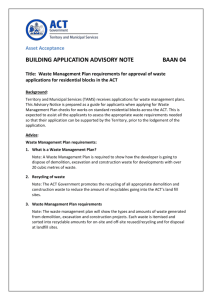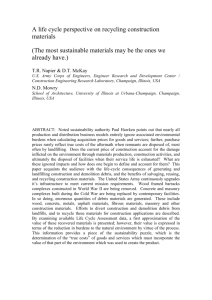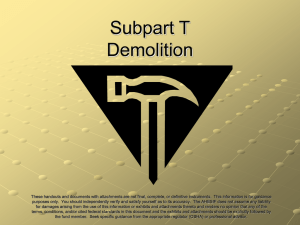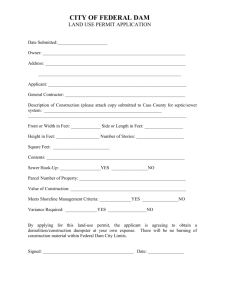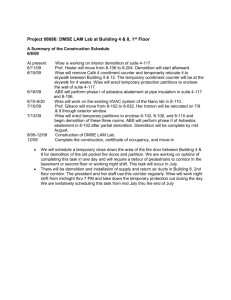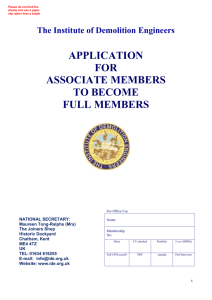Construction and demolition debris
advertisement
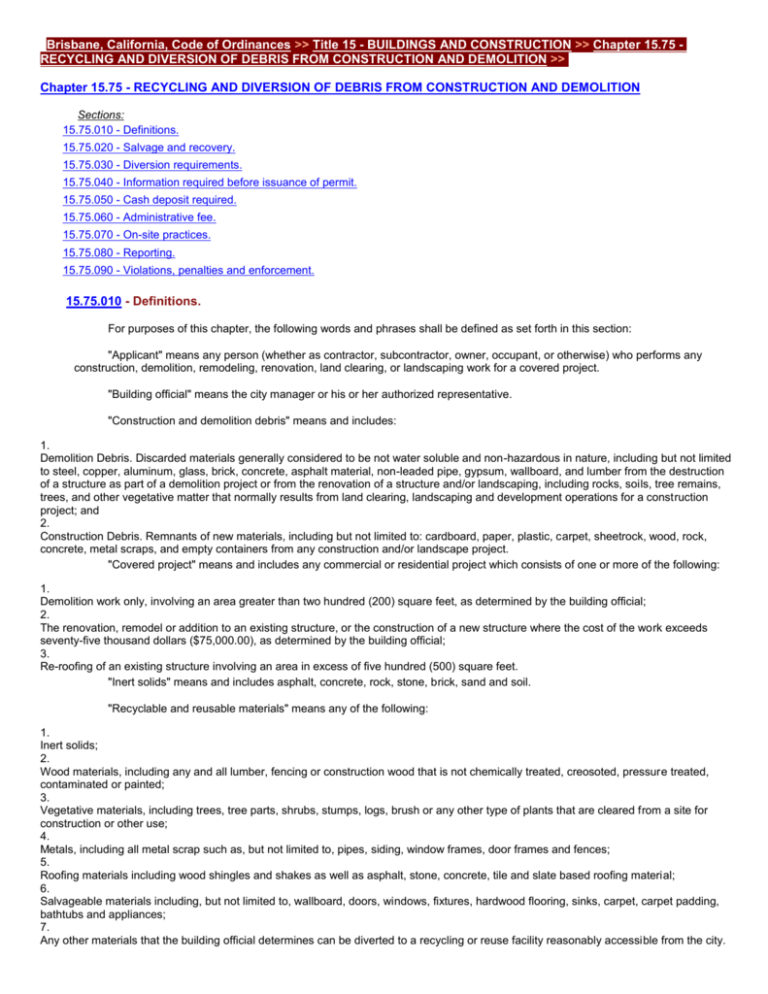
Brisbane, California, Code of Ordinances >> Title 15 - BUILDINGS AND CONSTRUCTION >> Chapter 15.75 RECYCLING AND DIVERSION OF DEBRIS FROM CONSTRUCTION AND DEMOLITION >> Chapter 15.75 - RECYCLING AND DIVERSION OF DEBRIS FROM CONSTRUCTION AND DEMOLITION Sections: 15.75.010 - Definitions. 15.75.020 - Salvage and recovery. 15.75.030 - Diversion requirements. 15.75.040 - Information required before issuance of permit. 15.75.050 - Cash deposit required. 15.75.060 - Administrative fee. 15.75.070 - On-site practices. 15.75.080 - Reporting. 15.75.090 - Violations, penalties and enforcement. 15.75.010 - Definitions. For purposes of this chapter, the following words and phrases shall be defined as set forth in this section: "Applicant" means any person (whether as contractor, subcontractor, owner, occupant, or otherwise) who performs any construction, demolition, remodeling, renovation, land clearing, or landscaping work for a covered project. "Building official" means the city manager or his or her authorized representative. "Construction and demolition debris" means and includes: 1. Demolition Debris. Discarded materials generally considered to be not water soluble and non-hazardous in nature, including but not limited to steel, copper, aluminum, glass, brick, concrete, asphalt material, non-leaded pipe, gypsum, wallboard, and lumber from the destruction of a structure as part of a demolition project or from the renovation of a structure and/or landscaping, including rocks, soils, tree remains, trees, and other vegetative matter that normally results from land clearing, landscaping and development operations for a construction project; and 2. Construction Debris. Remnants of new materials, including but not limited to: cardboard, paper, plastic, carpet, sheetrock, wood, rock, concrete, metal scraps, and empty containers from any construction and/or landscape project. "Covered project" means and includes any commercial or residential project which consists of one or more of the following: 1. Demolition work only, involving an area greater than two hundred (200) square feet, as determined by the building official; 2. The renovation, remodel or addition to an existing structure, or the construction of a new structure where the cost of the work exceeds seventy-five thousand dollars ($75,000.00), as determined by the building official; 3. Re-roofing of an existing structure involving an area in excess of five hundred (500) square feet. "Inert solids" means and includes asphalt, concrete, rock, stone, brick, sand and soil. "Recyclable and reusable materials" means any of the following: 1. Inert solids; 2. Wood materials, including any and all lumber, fencing or construction wood that is not chemically treated, creosoted, pressure treated, contaminated or painted; 3. Vegetative materials, including trees, tree parts, shrubs, stumps, logs, brush or any other type of plants that are cleared from a site for construction or other use; 4. Metals, including all metal scrap such as, but not limited to, pipes, siding, window frames, door frames and fences; 5. Roofing materials including wood shingles and shakes as well as asphalt, stone, concrete, tile and slate based roofing material; 6. Salvageable materials including, but not limited to, wallboard, doors, windows, fixtures, hardwood flooring, sinks, carpet, carpet padding, bathtubs and appliances; 7. Any other materials that the building official determines can be diverted to a recycling or reuse facility reasonably accessible from the city. "Salvage" means the controlled removal of materials from a covered project, for the purpose of reuse or storage for later reuse. "Structure" means anything that is built or constructed and requires a location on the ground, including a building or edifice of any kind, or any piece of work artificially built up or composed of parts joined together in some definite manner. (Ord. 493 § 2(part), 2004). 15.75.020 - Salvage and recovery. A. Prior to demolition of a covered project, the applicant shall make each structure planned for demolition available for salvage and recovery. It shall be the responsibility of the applicant to recover the maximum feasible amount of recyclable and reusable materials. B. Recovered and salvaged recyclable and reusable materials from the deconstruction phase shall be counted towards the diversion requirements of this chapter. C. Recovered or salvaged materials may be given away or sold on the premises, or may be removed to reuse warehouse facilities for storage or sale. D. No demolition may commence until a period of at least five (5) working days has elapsed from the date of issuance of a demolition permit. E. In the event the applicant believes that no materials can be salvaged, a written form must be completed and provided identifying the reasons why salvage and recovery cannot take place. City staff will determine whether this requirement shall be waived in whole or in part. F. For emergency demolitions where the structure being demolished poses an immediate hazard to life or surrounding property, the five (5) day salvage period requirement shall be waived upon verification of the emergency condition by city staff. (Ord. 493 § 2(part), 2004). 15.75.030 - Diversion requirements. A. The applicant shall divert at least the following specified percentages of construction and demolition debris generated from every covered project from going to the landfill by using recycling, reuse and diversion programs: 1. Demolition: One hundred percent (100%) of inert solids and fifty percent (50%) of demolition debris tonnage excluding inert solids; 2. Construction, remodeling and re-roofing projects: Fifty percent (50%) of all construction and demolition debris tonnage. B. The diversion requirements of this section may be met by any of the following methods: 1. Deposit of the recyclable and reusable materials into a debris box provided by the company furnishing solid waste collection services for the city; 2. Delivery of the recyclable and reusable materials to a recycling facility approved by the city; 3. Disposal of recovered or salvaged materials in accordance with Section 15.75.020(C). (Ord. 493 § 2(part), 2004). 15.75.040 - Information required before issuance of permit. Every applicant shall submit a properly completed "Recycling and Waste Reduction Plan," on a form prescribed by the building department, as a part of the building or demolition permit application for a covered project. The Recycling and Waste Reduction Plan shall contain an accurate estimate of the tonnage or other specified units of construction and/or demolition debris to be generated from construction and demolition on the site and the intended salvage, reuse, recycling, or other disposition of such debris. Approval of the Recycling and Waste Reduction Plan by the building official shall be a condition precedent to issuance of any building or demolition permit for a covered project. (Ord. 493 § 2(part), 2004). 15.75.050 - Cash deposit required. A. As a condition precedent to the issuance of any building or demolition permit for a covered project, the applicant shall post a cash deposit in an amount equal to two and one-half cents ($0.025) for each estimated pound of construction and demolition debris to be generated by the project, up to a maximum deposit of fifty thousand dollars ($50,000.00). The deposit shall be returned, without interest, in total or in proportion, upon proof to the satisfaction of the building official, that no less than the required percentages of construction and demolition debris have been diverted from landfills and have been recycled or reused. If a lesser percentage than required is diverted, a proportionate share of the deposit will be returned. The deposit shall be forfeited entirely or to the extent that there has been a failure to comply with the requirements of this chapter. B. If an applicant has previously forfeited a deposit for failure to comply with the requirements of this chapter, the amount of the deposit will be increased by one and one-half cents ($0.015) per pound, up to a maximum deposit of seventy-five thousand dollars ($75,000.00) for each subsequent project. (Ord. 494 § 1, 2004: Ord. 493 § 2(part), 2004). 15.75.060 - Administrative fee. As a condition precedent to the issuance of any building or demolition permit for a covered project, the applicant shall pay to the city an administrative fee, in such amount as established from time to time by resolution of the city council, to compensate the city for all expenses incurred in administering this chapter. (Ord. 493 § 2(part), 2004). 15.75.070 - On-site practices. During the performance of the covered project, the applicant shall recycle or divert the required percentages of construction and demolition debris and keep records thereof in tonnage or in other measurements approved by the building official that can be converted to tonnage. The building official will evaluate and monitor each covered project to gauge the percentage of construction and demolition debris which is being recycled, salvaged and disposed of from the project. Where both demolition and construction work will be performed, the required percentages of diversion shall be measured and reported separately for the demolition and construction phases of the project. To the maximum extent feasible, on-site separation of scrap wood and clean green waste in a designated debris box or boxes shall be arranged. (Ord. 493 § 2(part), 2004). 15.75.080 - Reporting. A. No later than sixty (60) days following completion of a covered project, the applicant shall, as a condition of final approval and for issuance of any certificate of occupancy, submit documentation to the building official that demonstrates compliance with the requirements of this chapter. B. The documentation shall consist of photocopies of receipts and weight tags or other records of measurement or equivalent documentation from recycling companies, deconstruction contractors, and landfill and disposal companies. The applicant's approved Recycling and Waste Reduction Plan shall be completed by recording and confirming the type of debris diverted and the facilities to which it was taken. The applicant shall sign the completed Recycling and Waste Reduction Plan form to certify its accuracy as part of the documentation of compliance. C. Progress reports during construction may be required for projects that take more than six (6) months to complete or have a valuation of more than one million dollars ($1,000,000.00). D. All documentation submitted pursuant to this section is subject to verification by the building official. E. It is unlawful for any person to submit documentation to the city under this section which that person knows to contain any false statements, including but not limited to false statements regarding tonnage of materials recycled or diverted, or to submit any false or fraudulent receipt or weight tag or other record of measurement. (Ord. 493 § 2(part), 2004). 15.75.090 - Violations, penalties and enforcement. A. Each violation of the provisions of this chapter shall constitute a public nuisance and be subject to abatement as such in the manner provided by law. B. Each violation of the provisions of this chapter shall constitute a misdemeanor, and shall be punishable by imprisonment in the county jail for up to six (6) months, or by a fine of up to one thousand dollars ($1,000.00), or both. Each day that a violation continues shall be deemed a new and separate offense. Where the violation is the failure to achieve the diversion requirement applicable to the covered project and the construction and demolition debris from the covered project have already been delivered to the landfill, the violation shall be deemed to have ceased after a period of ten (10) days. C. The building official shall have the authority to enforce this chapter, including but not limited to the authority to order that work be stopped where any work is being done contrary to the provisions of this chapter. D. No certificate of occupancy or final inspection approval shall be issued for any covered project unless the building department has determined that the provisions of this chapter have been complied with. (Ord. 493 § 2(part), 2004).
